

Comparison of Adjectives:Comparitive and Superlative Adjectives. When we want to compare two or more nouns using adjectives, we use the comparative and superlative forms of the adjective to show the comparison between the nouns.
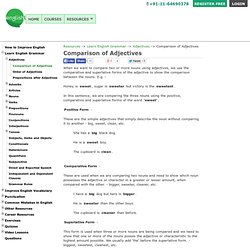
E.g. - Honey is sweet, sugar is sweeter but victory is the sweetest. In this sentence, we are comparing the three nouns using the positive, comparative and superlative forms of the word ‘sweet’. Positive Form - These are the simple adjectives that simply describe the noun without comparing it to another - big, sweet, clean, etc. She has a big black dog. He is a sweet boy. The cupboard is clean. Comparative Form - These are used when we are comparing two nouns and need to show which noun possesses the adjective or character in a greater or lesser amount, when compared with the other. - bigger, sweeter, cleaner, etc. I have a big dog but hers is bigger. Nouns:A Complete Guide to Noun with proper Examples. Nouns are simply the names we give to everything around us, whether it be a person, an event, a place or an object, etc.
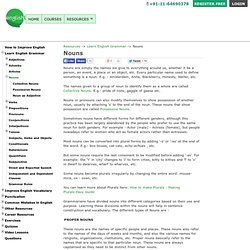
Every particular name used to define something is a noun. E.g. : Amsterdam, Anita, Blackberry, Honesty, Waiter, etc. The names given to a group of noun to identify them as a whole are called Collective Nouns. E.g.: pride of lions, gaggle of geese etc. Nouns or pronouns can also modify themselves to show possession of another noun, usually by attaching 's' to the end of the noun. Sometimes nouns have different forms for different genders, although this practice has been largely abandoned by the people who prefer to use the same noun for both genders. Most nouns can be converted into plural forms by adding ‘-s’ or ‘-es’ at the end of the word. But some nouns require the last consonant to be modified before adding ‘-es’. Some nouns become plurals irregularly by changing the entire word: mouse- mice, ox - oxen, etc. English Exercises:English Grammar Exercises:FREE Exercises.
Punctuation:Symbols and Rules of Punctuation:Learn Punctuation. Punctuation marks are important in both written and spoken English.
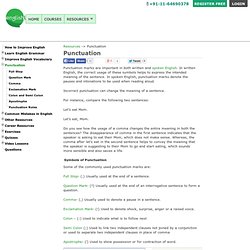
In written English, the correct usage of these symbols helps to express the intended meaning of the sentence. In spoken English, punctuation marks denote the pauses and intonations to be used when reading aloud. Incorrect punctuation can change the meaning of a sentence. For instance, compare the following two sentences: Let’s eat Mom. Let’s eat, Mom. Do you see how the usage of a comma changes the entire meaning in both the sentences? Symbols of Punctuation Some of the commonly used punctuation marks are: Full Stop- (.) Question Mark- (?) Comma- (,) Usually used to denote a pause in a sentence. Exclamation Mark- (!) Colon – (:) Used to indicate what is to follow next. Learn English Free:Practice and Learn English Free:Useful Resources. Learning English is Easy:Learn English Online Free with Englishleap. Interview Dress:Interview Wear:Tips to Dress for an Interview.
When you meet a potential employer, the first impression is based on what you’re wearing and how professional you look.
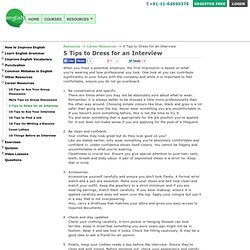
One look at you can contribute significantly to your future with the company and while it is important to feel comfortable, ensure you do not go overboard. Be conservative and specific. There are times when you may not be absolutely sure about what to wear. Remember, it is always better to be dressed a little more professionally than the other way around. Choosing simple colours like blue, black and grey is a lot safer than going over the top. Improve English Communication:Learn How to Improve English C. The importance of the English language cannot be overemphasized.
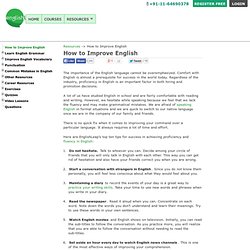
Comfort with English is almost a prerequisite for success in the world today. Regardless of the industry, proficiency in English is an important factor in both hiring and promotion decisions. A lot of us have studied English in school and are fairly comfortable with reading and writing. However, we hesitate while speaking because we feel that we lack the fluency and may make grammatical mistakes. We are afraid of speaking English in formal situations and we are quick to switch to our native language once we are in the company of our family and friends. There is no quick fix when it comes to improving your command over a particular language. Here are EnglishLeap’s top ten tips for success in achieving proficiency and fluency in English: